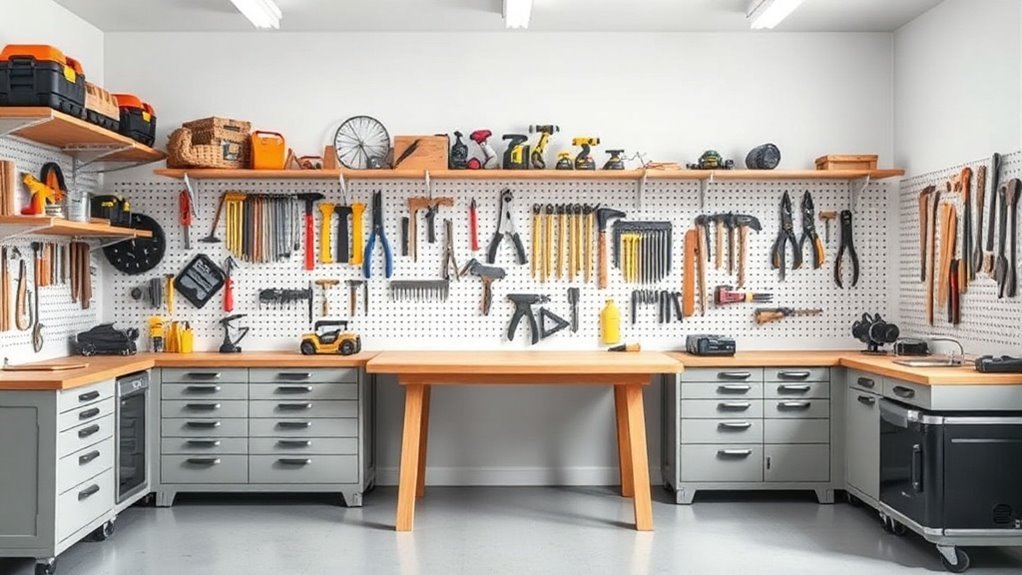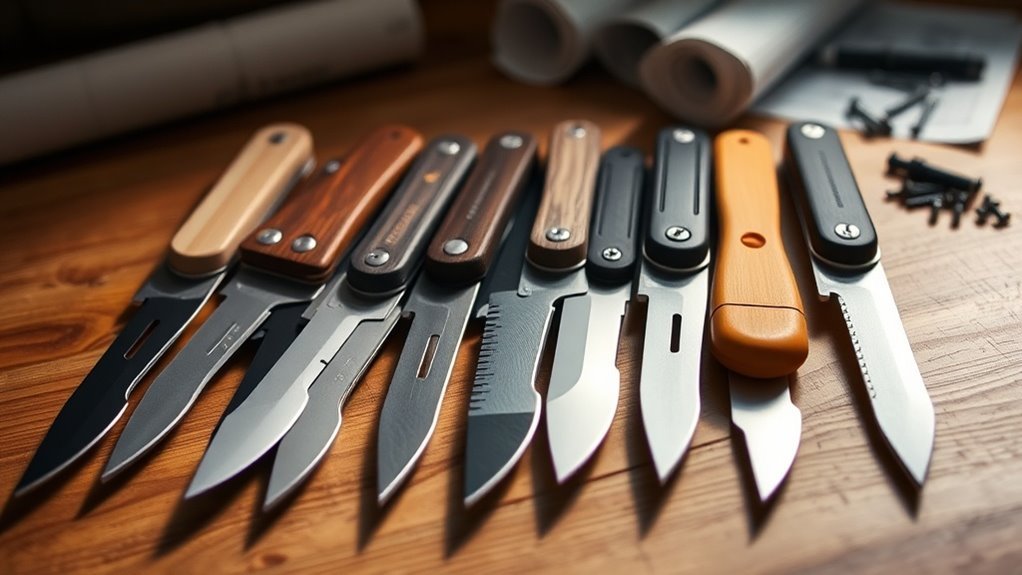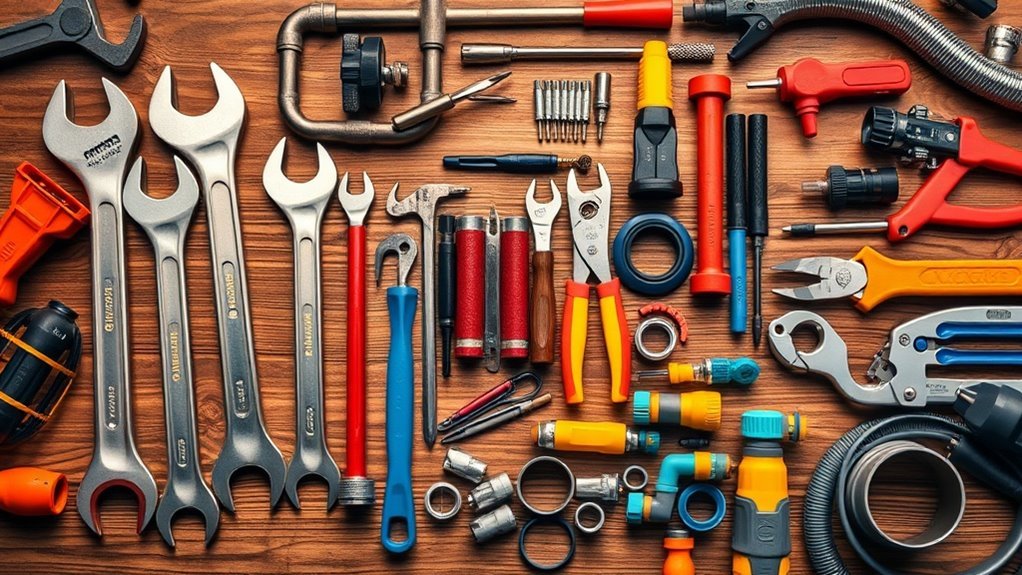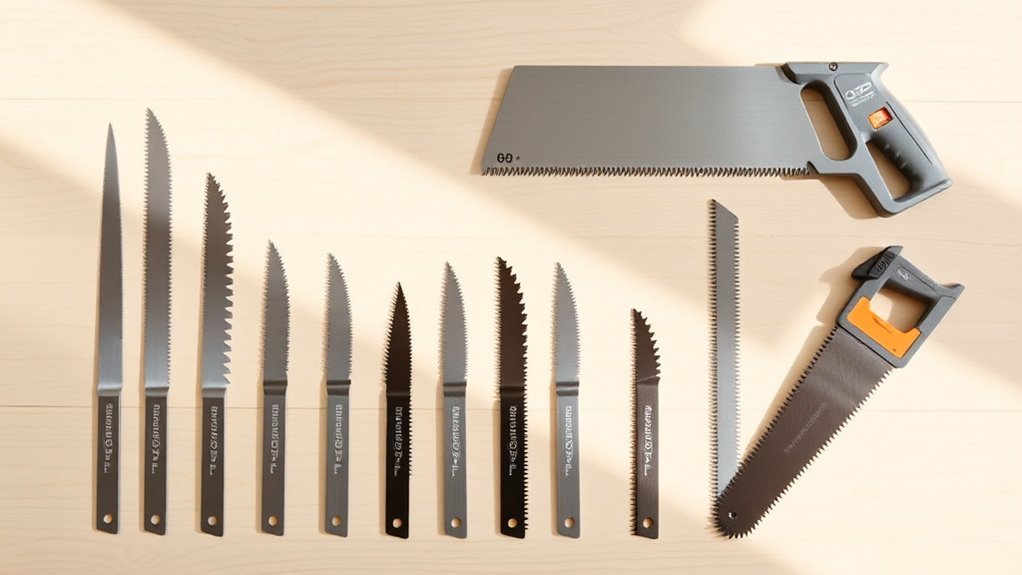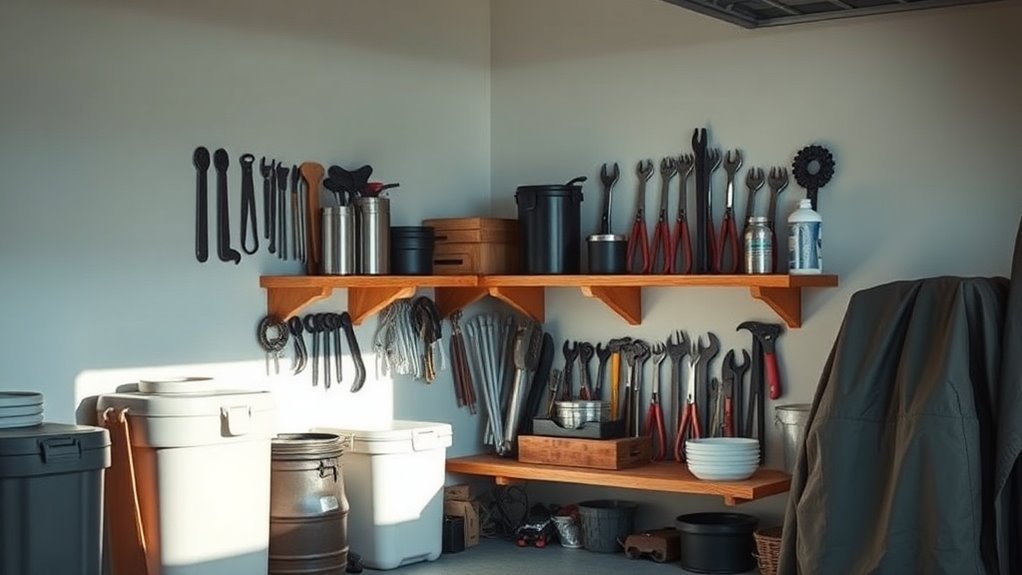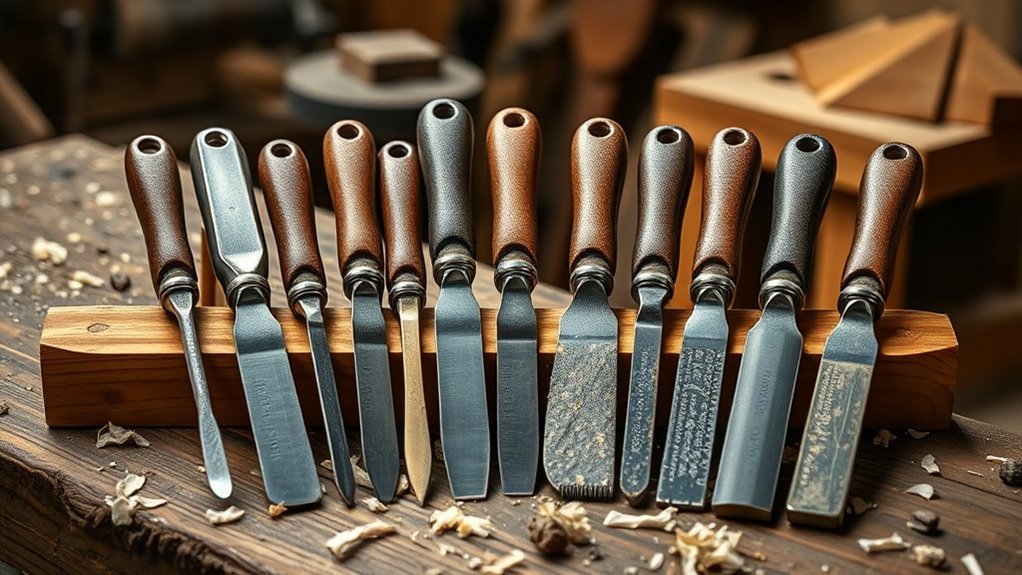Drill Bits Explained: Materials, Sizes, and Applications
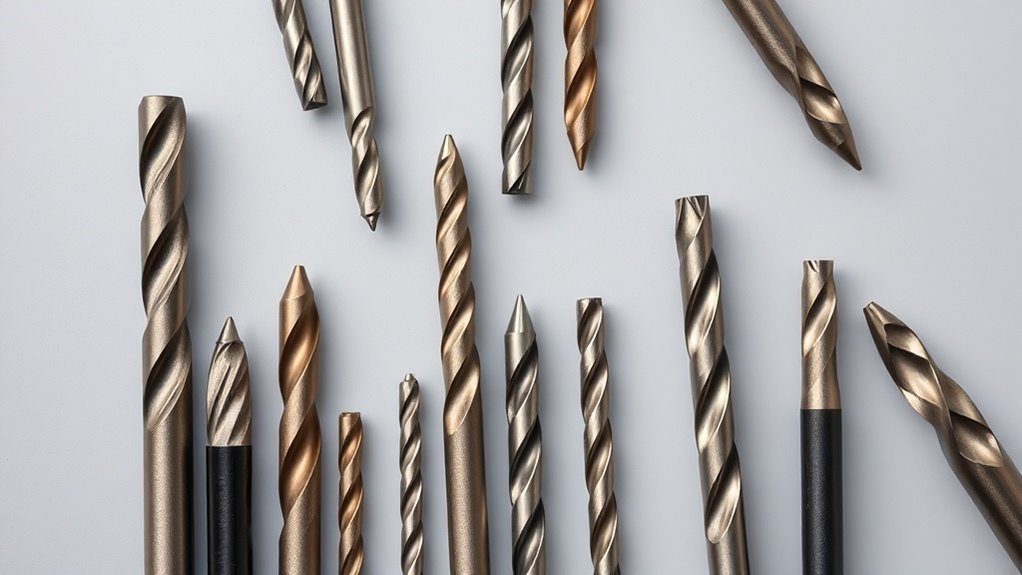
Drill bits come in different materials, sizes, and types, each suited for specific tasks. High-speed steel is great for general use, while carbide-tipped bits handle tougher materials. Sizes range from 1/16 inch for precision to 1 inch for larger jobs. Whether you need twist bits for wood or masonry bits for concrete, the right choice makes all the difference. Curious about how to maintain your bits or further details on their applications? There’s more to explore!
Key Takeaways
- Drill bits are made from various materials like HSS, carbide, and cobalt, each suited for specific drilling tasks and material types.
- Sizes range from 1/16 inch to 1 inch, with smaller bits used for precision work and larger bits for metal and woodworking projects.
- Common types include twist bits for general use, spade bits for larger holes, and masonry bits for hard surfaces like brick and concrete.
- Material selection affects performance; choose titanium-coated bits for metal and spade bits for wood to ensure optimal drilling efficiency.
- Proper maintenance, like cleaning and sharpening, extends drill bit life and maintains cutting performance for future projects.
Understanding Drill Bit Materials
When it comes to drill bits, the material they’re made from plays a crucial role in their performance and durability. You’ll often encounter bits made from high-speed steel (HSS), which offers good toughness and heat resistance, making it perfect for general-purpose drilling.
If you need extra durability, consider carbide-tipped bits; these are tough, wear-resistant, and excel in hard materials like metal and masonry.
For specific tasks, cobalt steel bits are great for drilling through tough steel, while titanium-coated bits provide a longer life by reducing friction.
Selecting the right material based on your project needs guarantees efficiency and longevity. Always check compatibility with your drill and the material you’re working on for best results.
Common Sizes and Their Uses
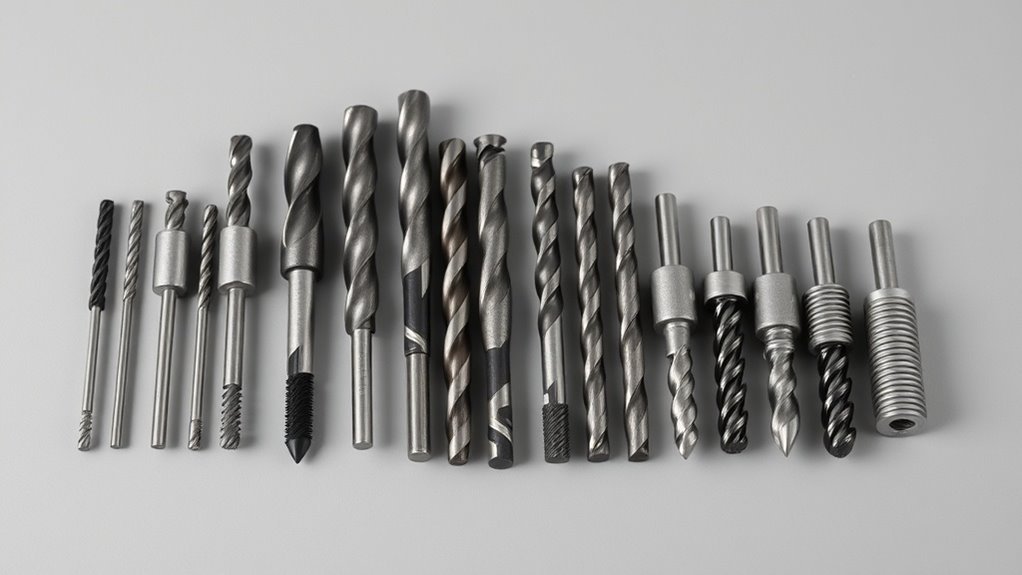
Drill bits come in various sizes, each tailored for specific applications. Common sizes range from 1/16 inch to 1 inch in diameter, catering to a wide range of tasks.
For small precision jobs like electronics, you’d typically use bits around 1/16 to 1/8 inch. In contrast, standard woodworking often requires bits from 1/4 to 3/8 inch for creating holes or driving screws.
If you’re working with metal, sizes like 1/2 to 3/4 inch are often preferred. Understanding these measurements helps you choose the right bit for your project, ensuring you achieve the desired hole size and fit.
Knowing common sizes and their uses can save you time and effort, making your drilling tasks more efficient and successful.
Types of Drill Bits and Their Functions
Choosing the right drill bit can make all the difference in your project. There are several types of drill bits, each designed for specific functions.
Selecting the appropriate drill bit is crucial for project success, with various types tailored to specific tasks.
Twist bits are the most common, perfect for drilling into wood and metal. Spade bits work well for larger holes in wood, while hole saw bits let you create circular openings efficiently.
For masonry, you should opt for masonry bits, designed to handle tough materials like brick and concrete. If you’re working with delicate materials, consider using brad point bits for precise drilling.
Finally, step bits are great for creating various hole sizes in thin materials. Understanding these types will help you select the best one for your needs and guarantee successful results.
Choosing the Right Drill Bit for Different Materials
Selecting the right drill bit for various materials is key to achieving clean and efficient results. Each material has specific requirements that affect your choice.
Here are three common materials and the ideal drill bits for them:
- Wood: For smooth cuts, use a twist or spade bit. They minimize splintering and guarantee clean entry.
- Metal: Choose a high-speed steel bit or titanium-coated bit. These will resist heat and provide durability for tougher tasks.
- Masonry: Use a carbide-tipped or masonry bit, designed to penetrate hard surfaces like brick and concrete easily. Additionally, understanding drill capabilities is crucial for selecting the best bit for your project.
Maintenance and Care for Your Drill Bits
Although it might seem easy to overlook, proper maintenance and care for your drill bits can greatly extend their lifespan and performance.
Start by keeping them clean. After use, wipe away debris and oil them lightly to prevent rust. Store your bits in a designated case or holder to avoid damage; don’t toss them in a toolbox haphazardly.
To maintain drill bits, always clean them after use and store them properly in a designated case.
Regularly inspect your bits for wear and sharpness. If they’re dull, sharpen them using a suitable sharpening tool. You can also avoid overheating by using appropriate speeds and feeds during drilling. Additionally, be sure to control humidity levels in your storage environment as excess moisture contributes to rust formation.
Finally, when not in use, keep your drill bits away from moisture and extreme temperatures. By following these simple steps, you’ll guarantee your drill bits stay in top shape for longer projects.
Questions
Can I Sharpen Drill Bits at Home?
Yes, you can sharpen drill bits at home! Using a sharpening stone, file, or specialized tool, you can restore their edges. Just be careful and follow proper techniques to guarantee their effectiveness and longevity.
What Is the Lifespan of a Typical Drill Bit?
A typical drill bit’s lifespan varies, but you can expect around 80 to 100 holes for standard bits. Factors like material, usage, and maintenance play crucial roles in determining how long they’ll last.
Are There Environmentally Friendly Drill Bit Options Available?
Absolutely, you’re in luck! Some drill bits now flaunt eco-friendly credentials, crafted from sustainable materials or designed for durability. Who knew your power tools could be as green as your backyard garden?
How Do I Store Drill Bits Properly?
To store drill bits properly, keep ’em in a dry, organized place. Use a labeled container or magnetic strip for easy access. Avoid exposure to moisture and extreme temperatures to maintain their sharpness and integrity.
What Brands Are Known for Quality Drill Bits?
You’ll find quality drill bits from brands like DeWalt, Bosch, and Milwaukee. These companies have a reputation for durability and performance, making them reliable choices for any DIY project or professional work you might undertake.
Conclusion
To sum up, knowing the right drill bit can make you feel like a wizard in the workshop, conjuring precision with every turn. With a grasp on materials, sizes, and applications, you’re well-equipped to tackle any project. Remember, the right choice saves time and effort, whether you’re drilling wood, metal, or masonry. Don’t underestimate the power of a good drill bit—your next masterpiece depends on it! So, gear up and drill with confidence!

